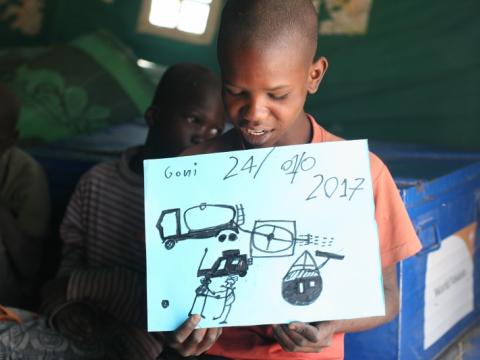Goni the artist, dreams of becoming the wise man of his village

In crises or conflicts, children’s drawings often tell the tale of what they have lived through, but also how they look back at their land of origin. Drawings can reveal problems they had to face, such as insecurity, fear and anxiety stemming from exposure to traumatic events. Although many of the drawings depict fear and terror, there is also an element of hope for the future and gratitude for the help received. The drawings from children attending the Child Friendly Space (CFS) at Sayam Forage refugee camp in Diffa, established by World Vision a year ago, confirm this narrative.
Behind each drawing is a story, and that was certainly the case of Goni who illustrated a convoy of armed vehicles, headed to war. Goni Mahamadou is a teenage refugee from Alagarno village in Borno state, Nigeria. He was shy to share his sad story, but eventually opened up. “Boko Haram attacked our village ten months ago. The attack took place during the four o’clock prayer. We heard gun fire from the north of our village. For some reason all my family members including my father were at home. We had to flee the house and my father took the lead. When we were out of the village, we were able to find a car, to travel to Bosso in Niger (around 450km from Alagarno). We stayed in Bosso, four months, before going to Garin Wanzam settlement in Diffa, because of the Boko Haram attacked Bosso, (June 2016). From the settlement we were re-located to Sayam Forage camp. In this place, I have been living with my family for the past three months”, Goni says, facing downwards.
Like many children, Goni describes his life back home, before the crisis. “Back home, I used to farm corn, attend Koranic school, ferry stuff at the local market using a two-wheeled trolley and I played a game called ‘langa’ (hopping on one leg) with my friends. With my work I earned, 2 000 Naira (US $5.00). I spent my earnings, buying clothes, shoes and giving the rest to my mother”, adds Goni while inking a new drawing.
After recalling his past experience, Goni was very keen to show me his first drawing, depicting army forces in a convoy, as he had seen during the attack in Bosso. When asked why he drew it, he said, “Because the Niger army have to pursue the people that forced us to leave our home”.
Goni is pleased to draw a picture depicting his life at the camp. His second drawing is completely different from the first one. When asked to describe it, Goni says,”I have drawn an ambulance, a water truck, our home and my friend Mohamadou and I holding hands. The ambulance takes the sick from the camp to Diffa, and the water truck brings safe water to the camp, for us to drink, use for cooking and washing. Mohamadou is the friend I found at the CFS. I had lots of friends back home, but I have made more friends at the camp”.
Although he would like to attend the CFS regularly, it is challenging to since his elder sister passed away. Now Goni has to ensure the house chores are done daily. He fetches water, cooks and searches for firewood in the bush. By the time he is done with his chores, the CFS is closed for the day. Goni’s dream is to go back to his normal life, in Alagarno and later become the wise man of the village. When asked why, he says, “Because a wise man, has a lot of respect, everybody consults him, and my father is one”.
Salisou, one of the CFS animators present, says, “The child friendly space, allows children like Goni to forget the atrocities they witnessed during the attacks. Because here they play games that allow them to relax and stop having nightmares”.
The CFS, established by World Vision a year ago, helps more than 1,000 children to recover from traumatic events. Goni is among the 1.4 million vulnerable children in the Lake Chad Basin crisis in need of protection and support to overcome the traumas of the crisis. World Vision calls on the donor and humanitarian community meeting in Oslo, Norway to provide psychosocial care, such as psychosocial first aid, and safe areas to play, interact and engage in group work, for children who have been exposed to traumatic events in line with recognised child protection standards and the UN Convention on the Rights of the Child.
World Vision calls on donors meeting in Oslo to support the strengthening of the child protection system in the Lake Chad Basin such that the 4 countries affected by conflict have a qualified social welfare workforce providing quality child protection services to children affected by conflict
World Vision calls on donors to support the development of professionals with the ability to provide psychosocial support to children formerly associated with armed forces
World Vision calls on delegates at the Oslo meeting to support the criminalization and prohibition of child recruitment into armed groups in countries where this law is not yet in place